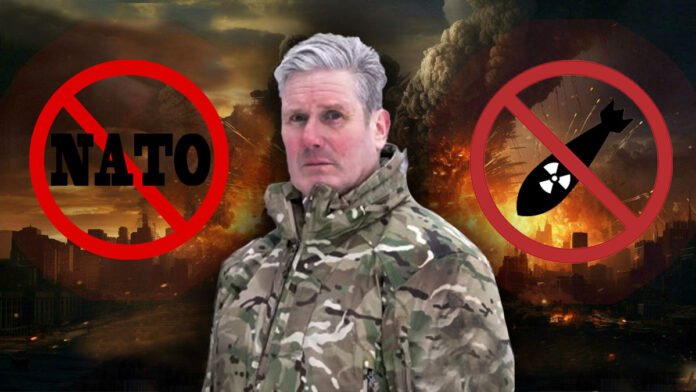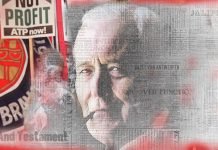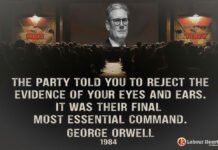Will The Real Keith Starmer Please Stand Up: NATO Hypocrisy
The political circus continues its never-ending performance, with Prime Minister, Sir Keir Starmer as the star acrobat, executing breathtaking ideological somersaults that would make even the most seasoned gymnast dizzy. Ladies and gentlemen, prepare to be amazed by the man who can change his core beliefs faster than you can say “electoral expediency”!
In our latest act, we witness Starmer’s passionate love affair with NATO, an organisation he once suggested should be dismantled. Yes, you heard that right! The same man who, as Secretary of the Haldane Society of Socialist Lawyers, advocated for “abandoning weapons and strategies of genocide” now waxes lyrical about NATO’s virtues as if it were the second coming of sliced bread.
We have gotten pretty used to Starmer’s flip-flops, his breaking of pledges even his measly-mouthed play on words to change the very meaning of his promises.
Throughout the conflict in Ukraine at every given opportunity, Starmer has regurgitated his NATO mantra, drawing on the former Labour Prime Minister Clement Attlee as a foundation of Labour’s commitment to Nato, hoping to give his stance credibility, hoping we all forget the fact that was last century, that was the century of the cold war and the Soviet Union, a threat that no longer exists.
To listen to Sir Keir Starmer’s unbridled praise for the military alliance of Western imperialists is just cynical it’s nauseating, to compare it to Britain’s National Health Service as one of “the great achievements of the 1945 Labour government”; a “transformational legacy” that apparently has Labour’s “proud”, “unwaverable”, and “unshakeable” support.
“To condemn NATO is to condemn the guarantee of democracy and security it brings,” proclaims our intrepid leader. One can’t help but wonder if he’s shared this profound insight with the people of Afghanistan, who surely must be feeling particularly secure and democratic after NATO’s 20-year occupation of their country. Maybe his message will resonate within the slave markets of Libia, a failed state after Nato’s intervention.
But let’s not dwell on such trifling matters as consistency or historical accuracy. After all, Starmer has perfected the art of the political U-turn, elevating it from mere flip-flopping to an elegant ballet of betrayal. His election pledges? Merely suggestions. His past criticisms of NATO? A youthful indiscretion. His principles? As flexible as a rubber band in a heatwave.
In Starmer’s world, the past is not merely prologue; it’s a convenient fiction to be rewritten at will. The Soviet Union may no longer exist, but don’t let that stop you from dusting off Cold War rhetoric, Sir Keir! After all, nothing says “progressive leadership” quite like resurrecting the spectres of conflicts past.
As we watch this spectacle unfold, you can’t help but be reminded of George Orwell’s prescient words: “The most effective way to destroy people is to deny and obliterate their own understanding of their history.” Starmer seems to have taken this not as a warning, but as a how-to guide.
So, as we bear witness to this masterclass in political shape-shifting, let us ponder: Is it too much to ask for a leader whose words today might bear some resemblance to their actions tomorrow? Or should we simply embrace the absurdity and admit that in the grand theatre of British politics, consistency is nothing more than a quaint relic of a bygone era?
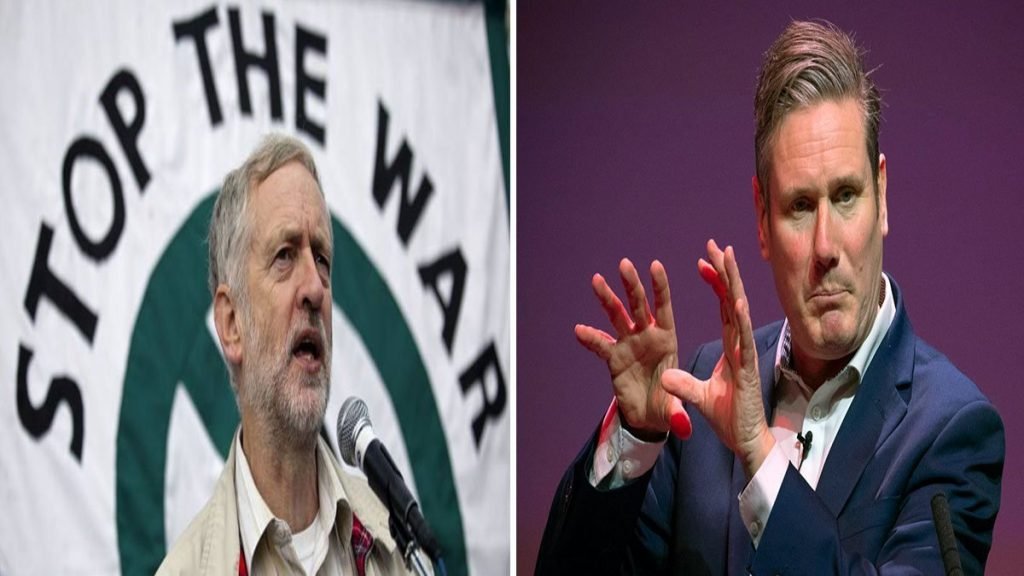
However, no matter Starmer’s expediency in such matters, we should always point out the hypocrisy of their condescending statements that are made to attack a better person while trying to enforce a moral high ground they just don’t have.
Starmer used his now NATO views as a weapon to bring down more ammunition as to why Jeremy Corbyn would not stand as the Labour candidate for North Islington in the next general election.
Corbyn is on record, in a Times radio broadcast, as saying: “I don’t blame NATO for the fact that Russia has invaded Ukraine. What I say is look at the thing historically, and look at the process that could happen at the end of the Ukraine war.”
He also said: “The issue has to be: what’s the best way of bringing about peace in the future? Is it by more alliances? Is it by more military build-up?“ Or is it by stopping the war in Ukraine and the other wars … that are going on at the present time, which are also killing a very large number of people? And ask yourself the question: do military alliances bring peace? Or do they actually encourage each other and build up to a greater danger?”
Corbyn – a long-standing critic of the transatlantic military alliance – said while he accepted the group was not going to be scrapped immediately, people should re-examine it after the conflict in Ukraine ends.
Starmer used Corbyn’s NATO views to stack more ammunition as to why he will never run as a Labour MP again.
Asked whether his predecessor could be readmitted to the parliamentary party after his comments, Sir Keir told the BBC’s Sunday Morning programme: “It is very difficult to see how that situation can now be resolved.”
He added: “[Mr Corbyn] lost the whip because of his response to the Equalities and Human Rights Commission in relation to anti-Semitism, but I made it very clear, the first thing I said as party leader was that I was going to tear out anti-Semitism by its roots in our party.
“I’ve also made it clear that our position in the Labour Party is not to accept the false equivalence between Russian aggression and the acts of NATO.”
The current Labour leader insisted the party’s stance under both his leadership and Mr Corbyn’s was pro-Nato and that was not going to change.
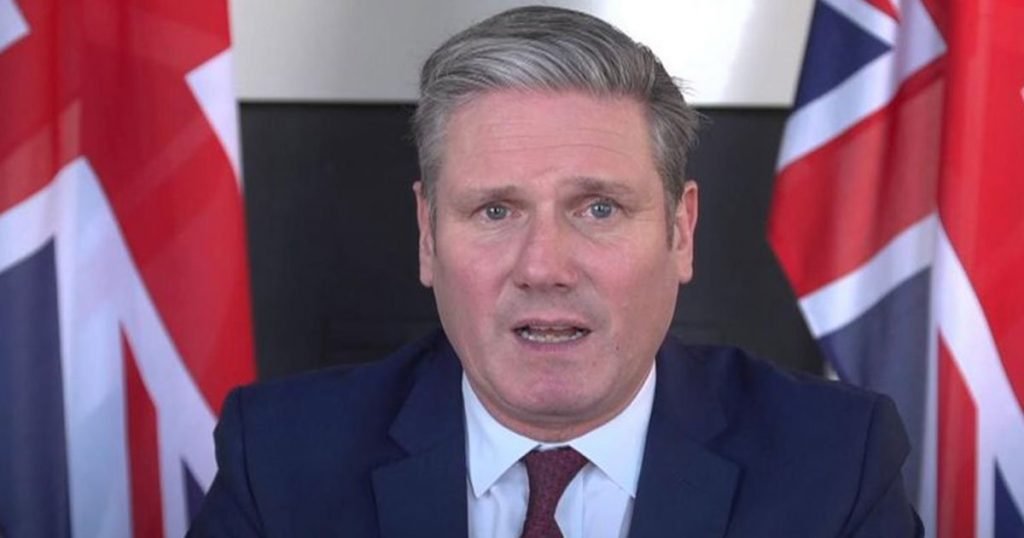
Looking to paint himself in a different light from the views of his predecessor Jeremy Corbyn, Starmer has proudly declared his and the Labour Party’s unconditional support of NATO.
It’s from that position Starmer has attacked Jeremy Corbyn, using Corbyn’s views on NATO to virtually guarantee that he will never have the whip restored, in layman’s terms Starmer will never allow Corbyn to stand as a Labour MP again.
Out of the Memory Hole: Starmer’s anti-Nato stance
These attacks on Corbyn for holding opinions that offer views towards peace, rather than war ironically are the same views that not so long ago Sir Keir Starmer held himself, however, that may have been before he became an establishment stooge.
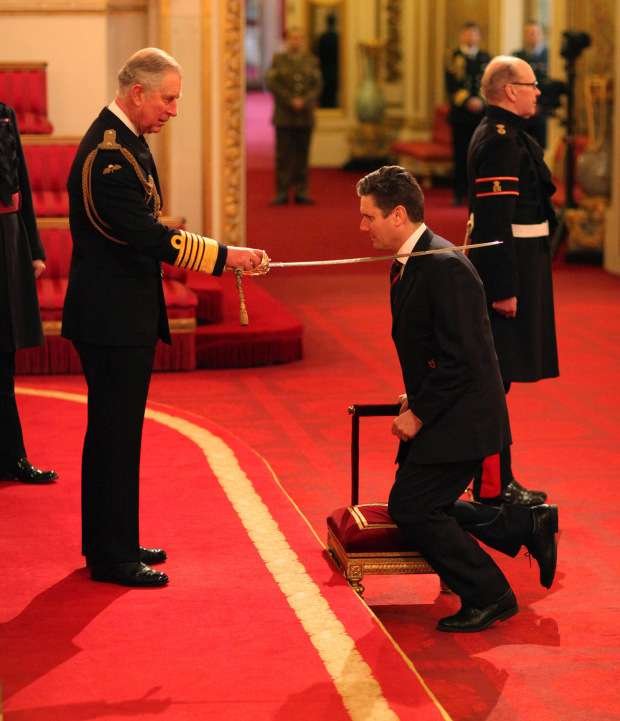
Listening to the Keir Starmer of today you would never guess that he had previously demanded the break up of Nato when practising as a human rights barrister.
However, since taking over as Labour leader, the Holborn and St Pancras MP like with so many things, including his election pledges, no longer holds that view or stands by his former policies.
Uncovered documents show the Labour leader advocated for ripping up the Nato defensive alliance while Secretary of the Haldane Society of Socialist Lawyers, Starmer suggested the UK and other Western countries should be “abandoning weapons and strategies of genocide”.
Today we not only see him distancing himself from his own former views on NATO but using them to condemn his predecessor, Sir Keir Starmer wrote in a newspaper article: “To condemn NATO is to condemn the guarantee of democracy and security it brings, and which our allies in eastern and central Europe are relying on, as the sabre-rattling from Moscow grows ever louder.”
He added: “There is no equivalence between a defensive alliance that has never provoked conflict and those who would inflict the appalling cost of war on others.”
It’s fair to say in modern politics you should never let a contradiction stand in the way of facts. Starmer claims “To truly stop war, you need to show you are serious about standing up for peace, that you are serious about keeping your promises to your friends, and that you will always stand up to those who threaten”. he conveniently misses out on the fact Ukraine is not a Nato member and the only alliance we have with Ukraine is the Minsk agreement that we failed to act upon, if we had perhaps things would be quite different in Ukraine right now.
Yet while Secretary of the Haldane Society of Socialist Lawyers, the group passed a resolution calling on “Britain and other capitalist countries” to disarm.
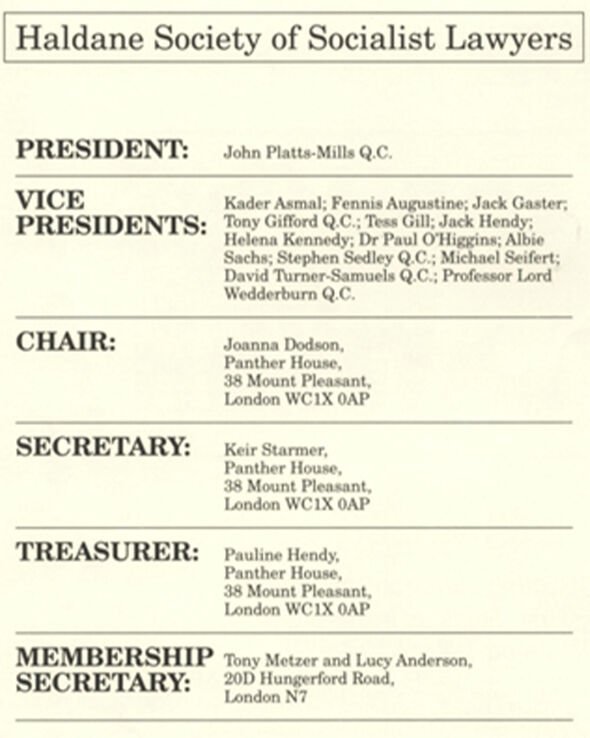
It added that the Labour Party should “adopt a non-nuclear, non-aligned defence policy as the precondition for the preservation and extension of human rights”.
The motion essentially backed scrapping Britain’s nuclear deterrent and leaving the Nato defence alliance.
The group claimed the policy was “key to victory at the next general election”.
The motion as passed was printed in issue No9 of the Socialist Lawyer publication in autumn 1989.
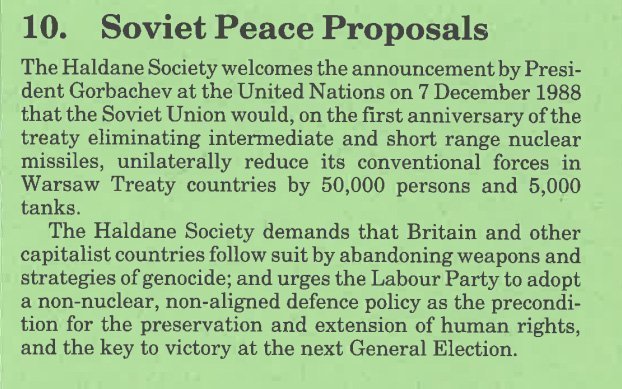
10. Soviet Peace Proposals
The Haldane Society welcomes the announcement by President Gorbachev at the United Nations on 7 December 1988 that the Soviet Union would, on the first anniversary of the treaty eliminating intermediate and short range nuclear missiles, unilaterally reduce its conventional forces in Warsaw Treaty countries by 50,000 persons and 5,000 tanks.
The Haldane Society demands that Britain and other capitalist countries follow suit by abandoning weapons and strategies of genocide; and urges the Labour Party to adopt a non-nuclear, non-aligned defence policy as the precondition for the preservation and extension of human rights, and the key to victory at the next General Election.
It was that year the Soviet Union started its collapse.
The fall of the Berlin Wall on 9 November 1989 was a pivotal event in world history which marked the falling of the Iron Curtain and one of the series of events that started the fall of the Soviet Union
The dissolution of the Soviet Union (1988–1991) was the process of internal disintegration within the Soviet Union (USSR) which resulted in the end of its existence as a sovereign state. It brought an end to General Secretary (later also President) Mikhail Gorbachev‘s effort to reform the Soviet political and economic system in an attempt to stop a period of political stalemate and economic backslide.
By late 1991, amidst a catastrophic political crisis, with several republics already departing the Union and centralized power waning, the leaders of three of its founding members declared that the Soviet Union no longer existed.
Eight more republics joined their declaration shortly thereafter. Gorbachev resigned in December 1991 and what was left of the Soviet parliament voted to end itself. Along with the Revolutions of 1989 in the Eastern Bloc, the dissolution of the Soviet Union marked the end of the Cold War.
That should have been the end of Nato.
That year changed many things, I’m ex-British Army and served in the British Army’s only nuclear missile regiment in West Germany before it disbanded.
When the Cold War finished, we all believed NATO would disband, but it didn’t, it changed its mandate, and it found new ways to use that alliance, it became an enforcer for corporate greed it moved to oppress other countries, like Iraq, Libya, and Afghanistan. It became a franchise for the industrial arms complex, moving constantly to the East. Something Biden had planned and advocated from 1997 onwards.
It should have changed to something new, but also there should have been a separate defence pact for the entire former Soviet Union Eastern Bloc countries, a non-aggression pact that would have brought about a workable situation where others could have come to the aid of any country attacked, unlike Ukraine that is now left alone.
Of course, NATO should have disbanded but it feeds the US economy and that’s why they keep pushing it.
That’s why they need their forever wars, that’s why it doesn’t matter who the ‘Threat’ is as long as there’s a ‘Threat’ to keep the people in fear and keep them paying their taxes for their defence.
President Dwight D. Eisenhower in his speech “The Chance for Peace”, also known as the Cross of Iron speech, shortly after the death of Soviet dictator Joseph Stalin, warned of the industrial arms complex.
Eisenhower evoked William Jennings Bryan in describing “humanity hanging from a cross of iron”. Although Eisenhower, a former military man, spoke against increased military spending, the Cold War deepened during his administration and political pressures for increased military spending mounted. By the time he left office in 1961, he felt it necessary to warn of the military-industrial complex in his final address
Every gun that is made, every warship launched, every rocket fired signifies, in the final sense, a theft from those who hunger and are not fed, those who are cold and are not clothed. This world in arms is not spending money alone. It is spending the sweat of its labourers, the genius of its scientists, the hopes of its children. The cost of one modern heavy bomber is this: a modern brick school in more than 30 cities. It is two electric power plants, each serving a town of 60,000 population. It is two fine, fully equipped hospitals. It is some fifty miles of concrete pavement. We pay for a single fighter with a half-million bushels of wheat. We pay for a single destroyer with new homes that could have housed more than 8,000 people. . . . This is not a way of life at all, in any true sense. Under the cloud of threatening war, it is humanity hanging from a cross of iron.
-President Dwight D. Eisenhower on April 16, 1953
A defence from enemies, real or perceived.
The US economy is held up by two Pillars one the petrol dollar and the other the industrial Arms complex and it’s struggling to find an alternative in a changing world.
The fact is Starmer advocated for NATO to be dissolved.
Keir Starmer, once an advocate for NATO dissolution and the elimination of weapons of mass destruction, now stands as the industrial arms complex’s staunchest supporter. This shift in stance raises questions about consistency and principles.
As a leader of a democratic socialist movement in the 21st century, it is paradoxical to endorse pouring weapons into foreign conflicts under the guise of an “anti-war” position. Such a stance contradicts the very essence of peace and diplomacy.
Furthermore, projecting Cold War-era brinkmanship risks dangerous escalation, potentially leading to a catastrophic World War 3. Advocates of de-escalation, diplomacy, and détente recognize that this approach is outdated—a legacy of Blairism and its controversial, illegal wars. Many on the left have firmly rejected this legacy.”
Support Independent Journalism Today
Our unwavering dedication is to provide you with unbiased news, diverse perspectives, and insightful opinions. We're on a mission to ensure that those in positions of power are held accountable for their actions, but we can't do it alone. Labour Heartlands is primarily funded by me, Paul Knaggs, and by the generous contributions of readers like you. Your donations keep us going and help us uphold the principles of independent journalism. Join us in our quest for truth, transparency, and accountability – donate today and be a part of our mission!
Like everyone else, we're facing challenges, and we need your help to stay online and continue providing crucial journalism. Every contribution, no matter how small, goes a long way in helping us thrive. By becoming one of our donors, you become a vital part of our mission to uncover the truth and uphold the values of democracy.
While we maintain our independence from political affiliations, we stand united against corruption, injustice, and the erosion of free speech, truth, and democracy. We believe in the power of accurate information in a democracy, and we consider facts non-negotiable.
Your support, no matter the amount, can make a significant impact. Together, we can make a difference and continue our journey toward a more informed and just society.
Thank you for supporting Labour Heartlands
